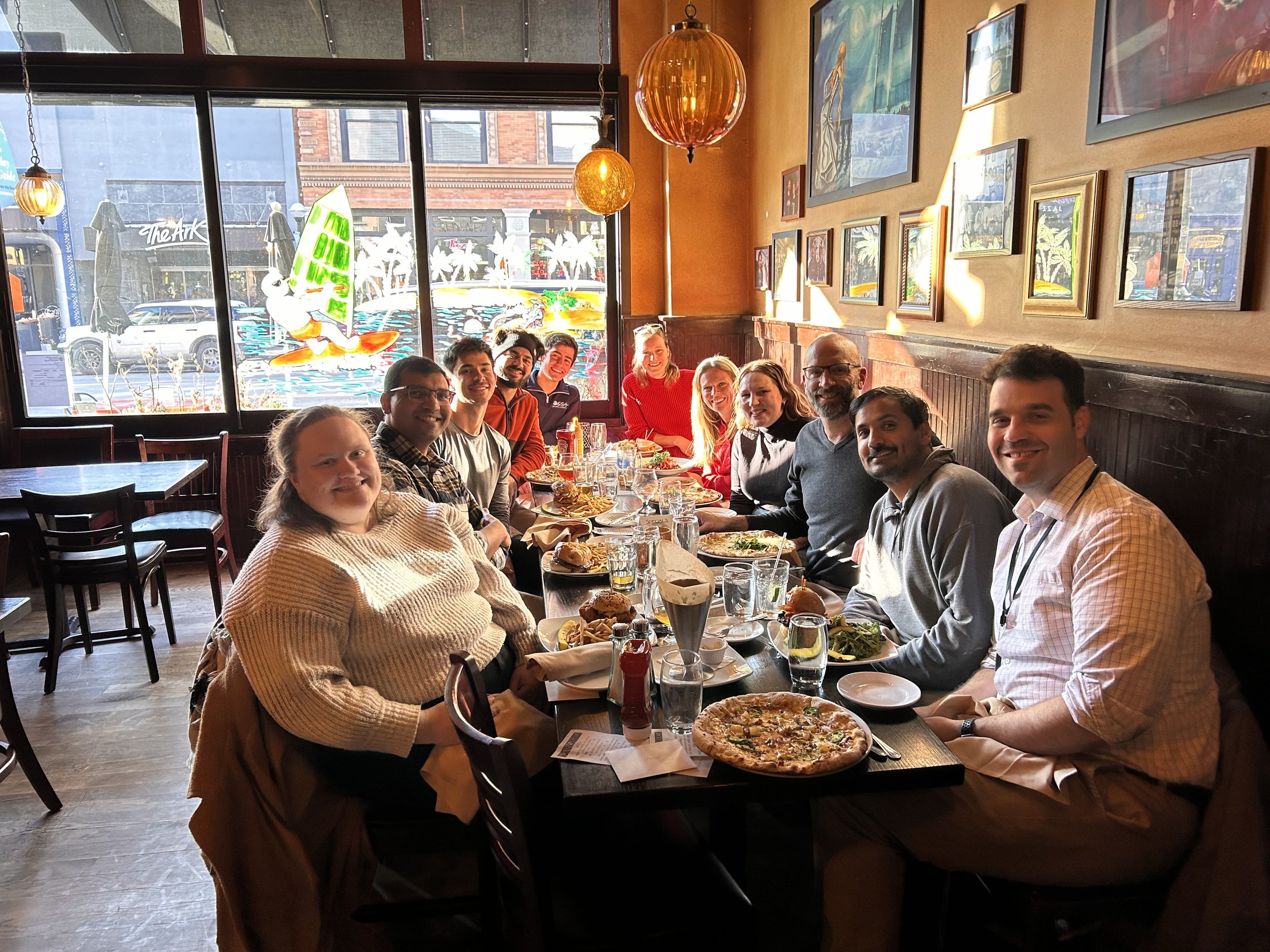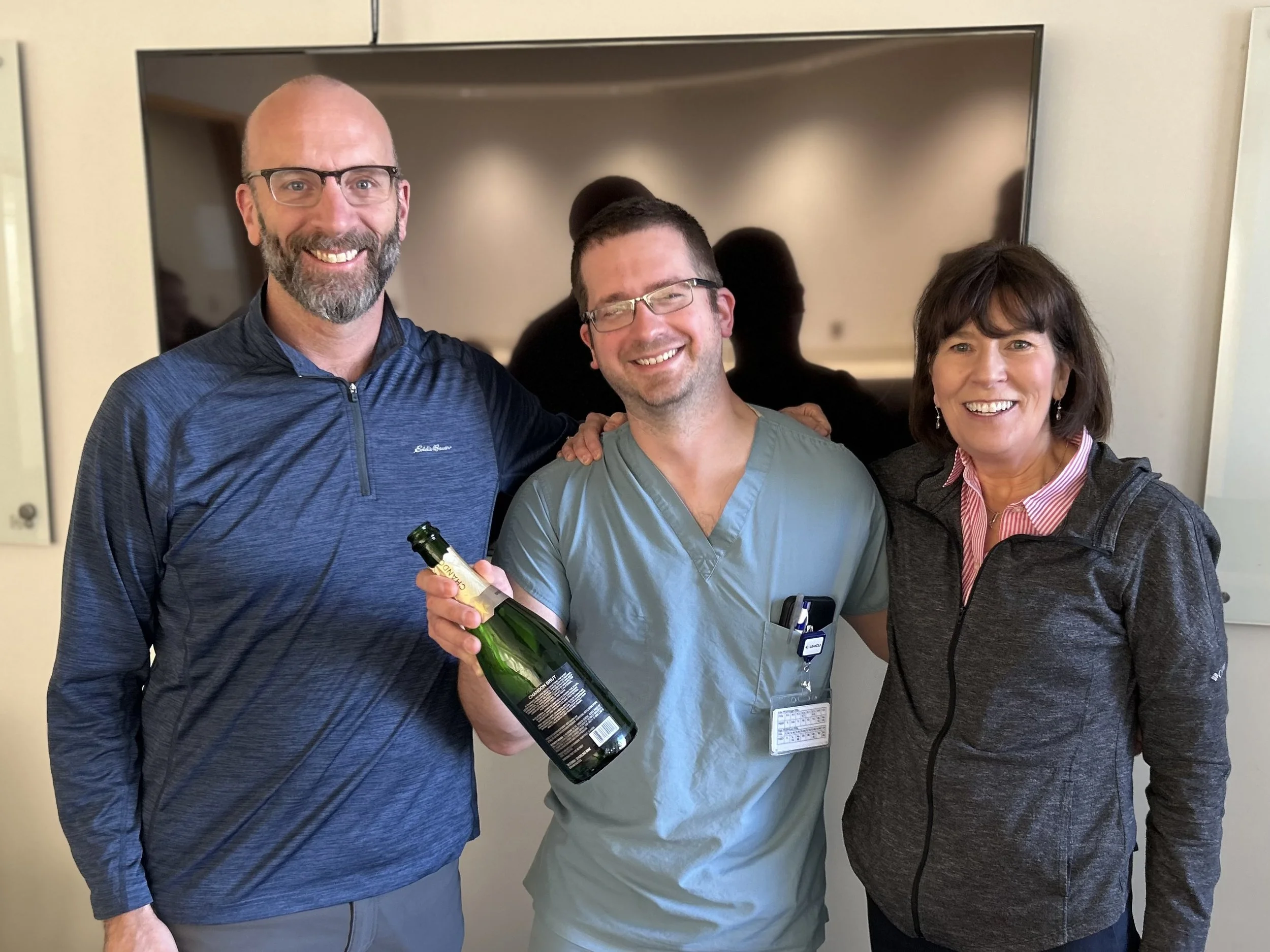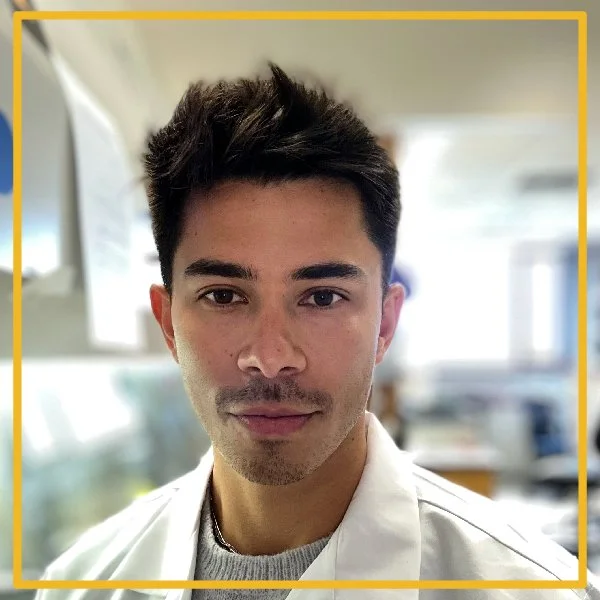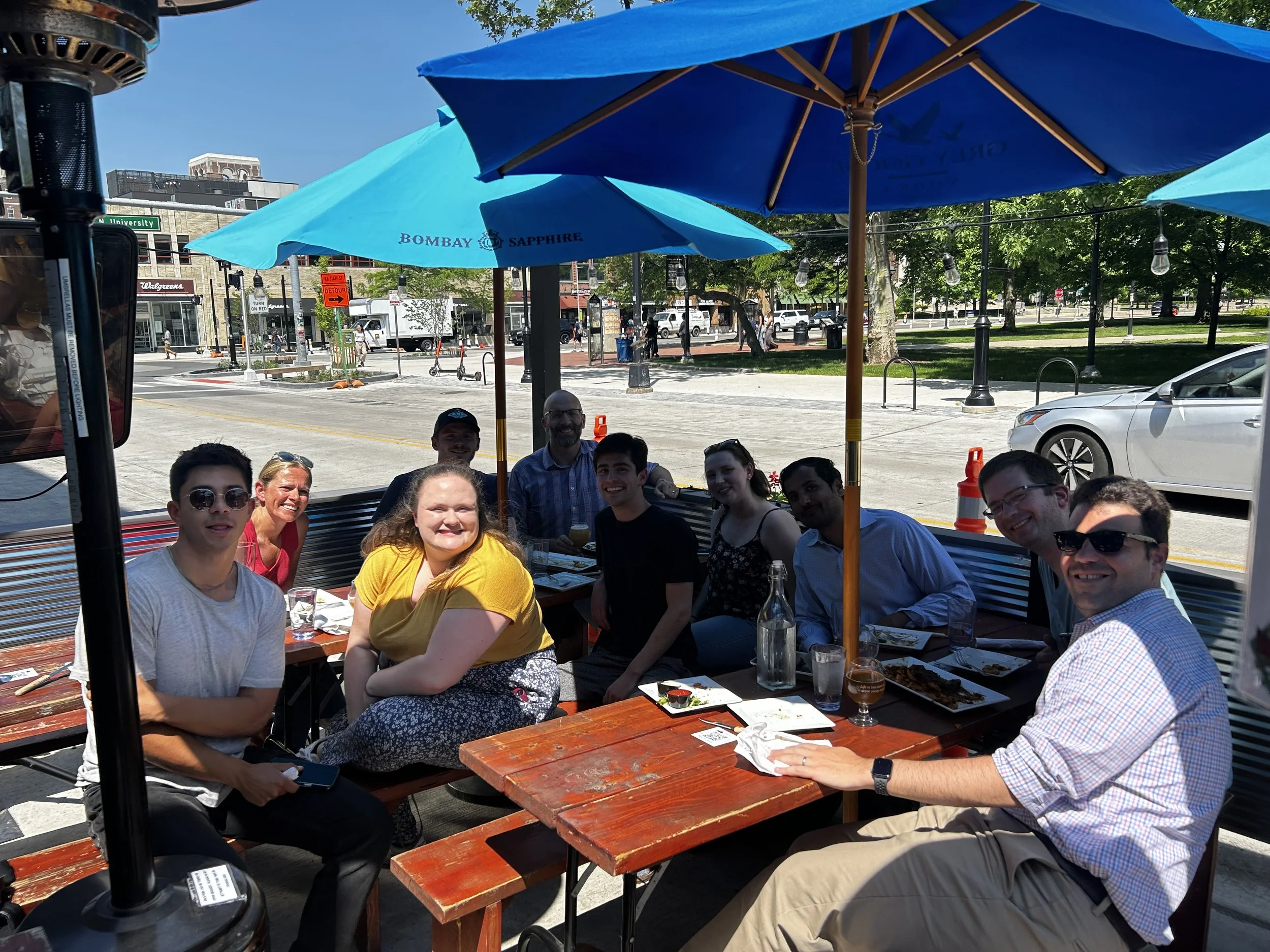Robert Dickson has been elected to the American Society for Clinical Investigation. He was one of five inductees from the University of Michigan (including friend-of-the-lab and collaborator Carl Koschmann), out of 100 total new inductees. The induction ceremony will occur on April 5 at the ASCI meeting in Chicago.
The lab got together at Jolly Pumpkin as an early holiday celebration, as well as a bittersweet send-off of Goda (who’ll be returning to Kiel later this month following completion of his rotation with us).
Robert Dickson was part of a team of investigators who have published a new original research manuscript in Nature Medicine: “Robust airway microbiome signatures in acute respiratory failure and hospital-acquired pneumonia.” This study both (1) meta-analyzed patient-level lung microbiome data from 17 published studies and (2) validated key findings in a new cohort of 136 mechanically ventilated patients. These results confirm the biological and clinical significance of respiratory microbiota in critical illness.
This study was a result of a European Union Horizon 2020 award (HAP2) to which Robert Dickson contributed microbiome data and analyses, led by Antoine Roquilly (senior author).
Huge congrats to Kale Bongers, whose K08 (Career Development Award) application received a spectacular, highly fundable score! No guarantees until the Notice of Award, but we’re highly optimistic about Kale’s chances! Kale is co-mentored on his application by Kathleen Stringer.
It’s been an extraordinary year for career development awards in the lab. Rishi Chanderraj (VA CDA), Michael Combs (K23), and Kale (K08) have all received fundable scores on their career development award applications in 2023.
Robert Dickson, Kale Bongers, Kathleen Stringer
Robert Dickson will be speaking on the topic of “Pneumonia and the Respiratory Microbiome” at on Sunday, October 8 at the CHEST Annual Meeting in Honolulu, Hawaii.
In Milan, at the International Congress of the European Respiratory Society, Robert Dickson was inducted as a Fellow of the European Respiratory Society.
The lab is excited to welcome two new members this summer!
Mark Adame is an MSTP (MD-PhD) student in the University of Michigan Medical School. He previously rotated through the Dickson Lab, contributing to our work on the role of the gut microbiome in temperature regulation in sepsis. He will now join the lab full-time, and investigate further how gut microbiota contribute to (and protect us from) organ failure in sepsis. Mark will be co-mentored by Kathleen Stringer, and will acquire skills both in microbiome and metabolomics analysis. Before medical school, Mark spent three years working in the lab of Sarkis Mazmanian at Caltech studying how gut microbial metabolites influence behavior.
Callie Drohan is a current Clinical Fellow in Pulmonary & Critical Care Medicine at the University of Michigan. Callie performed her residency training at the University of Pittsburgh, where she worked with Georgios Kitsios studying biomarkers in critical illness. Callie will be studying gut translocation as a biomarker and mediator of organ failure in critical illness.
Mark Adame
Callie Drohan
Robert Dickson will speak on the topic of the microbiome’s role in ARDS at the 6th International ARDS Conference in Dublin on June 20.
To celebrate Joe’s departure for med school and Anna joining the lab, we got together at Ashley’s.
The lab put on a great showing at ATS. Presentations from Brody Mayoras, Jenn Baker, Kale Bongers, Katie Winner, Joe Metcalf, and Rishi Chanderraj. Also: 3 of the PI-TB abstract award winners were from the lab! (Jenn, Kale, and Brody)
The lab got together at the American Thoracic Society conference to celebrate everyone’s successful presentations.
Kale Bongers has been awarded an ATS abstract award, joining Jenn Baker and Brady Mayoras (below). Congrats Kale!
Kale Bongers
Robert Dickson was part of an ATS workshop on the use of bronchoscopy in the study of critically ill patients. The workshop report is now published in Annals of the American Thoracic Society.
Robert Dickson has been selected to join the 2023 class of Fellows of the European Respiratory Society. He will be inducted at the 2023 ERS International Congress in Milan in September.
“The Fellow of ERS (FERS) award recognises excellence from within the ERS membership by acknowledging outstanding contributions in research, education and clinical leadership. Those contributions, combined with the candidate’s previous research records (h-index), form the basis for induction into this prestigious group. Up to 50 Fellows are selected each year and recipients may use the designation ‘FERS’ following their name. FERS awardees are also inducted into an elite advisory board that will be called upon by the Society on various matters in future years.”
Now online: a Research Letter in Chest on the topic of lactate clearance in sepsis, led by medical student Reid McCallister and Rishi Chanderraj. This was a collaboration with Mike Sjoding and Mark Nuppnau.
In sepsis, we give a lot of weight to “lactate clearance” - whether or not we’re able to decrease a patient’s blood lactate level with resuscitation. It is recommended in Surviving Sepsis guidelines (“…we suggest guiding resuscitation to decrease serum lactate in patients with elevated lactate level, over not using serum lactate”) and has been used both as an enrollment criterion and a physiological endpoint in clinical trials. But lactate is a highly limited index of perfusion and response to resuscitation, and is quite confounded by comorbidities (like liver and kidney injury).
Using clinical data from 4,775 patients (with sepsis, an elevated lactate, and at least two lactate measurements), we asked if initial lactate clearance predicts 1) subsequent lactate trajectories and 2) patient prognosis. We found that the answer to #1 is “no, not well” and the answer the #2 is “not nearly as well as the confounding comorbidities.” Much of the prognostic utility of “failure to clear lactate” is actually due to confounding by liver failure.
This is Reid’s first first-author publication, and Rishi’s first senior-author publication. Congrats to both!
Reid McCallister
Rishi Chanderraj MD MS
A team from our lab, led by Kale Bongers, has published a new study in the Blue Journal demonstrating that the gut microbiome plays a major role in the body’s calibration of temperature both in sepsis and in health. This translational study leveraged clinical data from 13,000 hospitalized patients, rectal swabs from 118 hospitalized patients, and a series of murine experiments using antibiotic-treated, germ-free, and gnotobiotic mice. We found that the same bacterial family (Lachnospiraceae) explains variation in the temperature response of both humans and mice. These findings may help explain both why temperature trajectory is so variable (and prognostically important) in sepsis, as well as why human body temperature has been steadily declining since the 1860s.
This study has been featured in more than 50 news sites, including Newsweek.
Kale Bongers MD PhD
The NIH (NHLBI, NIGMS) plans on launching the APS Consortium, dedicated to intensely studying the underlying biology of ARDS, Pneumonia, and Sepsis. Robert Dickson partnered with Bob Hyzy and Hallie Prescott to lead the University of Michigan application, and we have just received word that we have been chosen to join the network.
The APS Consortium will longitudinally study 5,000 hospitalized patients with these conditions, both while they are admitted and following discharge. The University of Michigan team joined forces with Henry Ford Hospital, University of Cincinnati, and University of Chicago. They proposed a plan to investigate the role of gut and respiratory microbiota in explaining the biological heterogeneity that underlies these diseases.
The application was strengthened by contributions from numerous collaborators as well as support from the Weil Institute for Critical Care Research & Innovation.
Robert Dickson will be speaking at the Keystone Conference “From First Breath: Lung Development, Infection, Repair and Aging” in Snowbird, Utah on Tuesday, April 25. His talk will be on “The Microbial Ecology of the Respiratory System.”
Both Jenn Baker (Microbiology & Immunology PhD student) and Brody Mayoras (UM undergraduate working with Jenn) have been awarded Abstract Scholarships by the American Thoracic Society. Congrats to Jenn and Brody!
Jenn Baker
Brody Mayoras
Callie Drohan (first-year PCCM fellow at UM, soon to join the Dickson Lab), joined by Robert Dickson and Phil Molyneaux, has published an editorial in the Blue Journal titled “How to Understand a Revolution: Guts, Lungs, and Bronchiectasis.” They discuss a recent multi-omic study of gut and lung microbiota in bronchiectasis by Narayana et al: Microbial Dysregulation of the Gut-Lung Axis in Bronchiectasis.
They draw an analogy between the study of history (specifically, the American Revolution) and the study of respiratory microbiology. The team was proud of the AI-assisted image they generated, but regrettably it didn’t make the final cut.


























